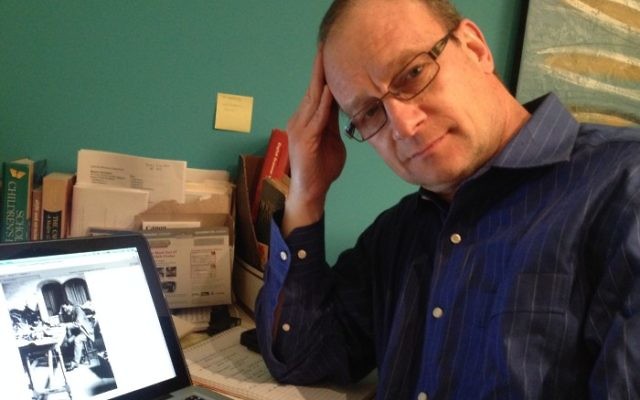Calling out the Elephant in the Room
"Existential issue" for Jews acknowledged at Islamic event in Atlanta.
Dave Schechter is a veteran journalist whose career includes writing and producing reports from Israel and elsewhere in the Middle East.
There was an elephant prowling the ballroom of a downtown Atlanta hotel on Nov. 4. Would anyone point out the pachyderm?
The answer came as Dr. Nabile Safdar, board chair of the Islamic Speakers Bureau of Atlanta, welcomed several hundred people attending ISB’s annual gala, telling them “Yes, we’re going to go there.”
Before we go there, a little background on ISB. For 23 years, under the direction of its founder and executive director, Soumaya Khalifa, the ISB has engaged in public outreach about Islam, through education programs, law enforcement training, and meetings with public officials and civic organizations.
ISB has been a partner with Jewish organizations in interfaith efforts. Prominent members of the Jewish community serve on ISB’s Advisory Council. Members of the community have been honored by ISB.
Safdar, a pediatric radiologist in the Emory Healthcare Network, began: “The last month has been difficult. It’s been hard. And you all know what I’m talking about. Seeing the events in Palestine, seeing the events in Israel, has left us horrified. In a state of shock, with anger and grief, all of us have been mourning the loss of innocent lives. This has brought some of us closer. In some cases, it’s led to some distance, and suspicion, within communities and between communities and individuals. So, we’re going to talk about that distance tonight. Yes, we’re going to go there.”
In a noticeable gesture before a predominantly Muslim audience, Safdar first addressed the pain of the Jewish community. “There are those of us in this room who have said, with sincere conviction and in good faith, that the brutal events of October 7th were horrific and should be condemned, that Israel must be able to defend its civilian population against ongoing terrorist attacks and secure the return of the hostages — and that for Jews worldwide, this is an existential issue. And we hear that,” he said.
Turning the coin over, Safdar said, “And there are those of us in this room who have also said with equal conviction, and also in good faith, the Palestinians have been suffering from a brutal systematic oppression. That occupation is the root cause for the cycle of violence and that the disproportionate response constitutes war crimes and genocide, which should be condemned.”
Safdar spoke of how people in the room — Muslims, Jews, Christians, and members of other faith groups — had stayed in touch in the month since Oct. 7.
“Messages of solidarity, sometimes of anger. And some of them have been very tough conversations. But what we’ve also heard in those messages is ‘I hope you are safe. We stand for your safety and security. We stand for the safety and security of all the children, of all the students. Here in Atlanta, we will not stand for Islamophobia. We will not stand for antisemitism or anti-anything.’ Please make sure you are living free from injustice and free from hate,” he said.
Safdar quoted the late civil rights activist and author James Baldwin: “We can disagree and still love each other unless your disagreement is rooted in my oppression and denial of my humanity and right to exist.”
Safdar continued: “Even if we’re just holding on by a thread, by being here tonight, we are bearing witness to the commitment in James Baldwin’s statement. That we must stand together, to continue conversation, even when it’s difficult to affirm each other’s humanity and right to exist free of oppression, regardless of who were are. And in this we ask for your support, your grace, and your forgiveness, for what we’ve said and for what we haven’t said.”
Among the clergy offering prayers was Rabbi Lydia Medwin, of The Temple, who also addressed the current events.
“It would be strange if I, a rabbi, did not name what might otherwise be the elephant in the room. So let me start by expressing to my Muslim brothers and sisters my most sincere condolences. I am sad with the pain of this community’s losses in Gaza and the West Bank. I know some of you may have personal losses in the war happening between Israel and Hamas in Southern Israel and Gaza,” she said. “Let me say unequivocally that every human loss is a tragedy beyond measure, and the pain it causes cuts deep, reverberating across families and communities and peoples. Although the conflict and the losses are happening far from here geographically, we know that it feels as if it’s happening right down the street, that’s how present it is in our hearts and minds. I feel it, too. I too have personal stories of unspeakable violence and loss, and a general sense that things will never be the same for a people and a place that l love.”
Further on, Medwin recited the poem, “Blessing for a Broken Vessel,” by Jan Richardson. The last stanza reads:
I am not asking you
to give up your grip
on the shards you clasp
so close to you
but to wonder
what it would be like
for those jagged edges
to meet each other
in some new pattern
that you have never imagined,
that you have never dared
to dream.
To which Medwin added at the end “and, perhaps, to dream of peace. Amen.”




comments